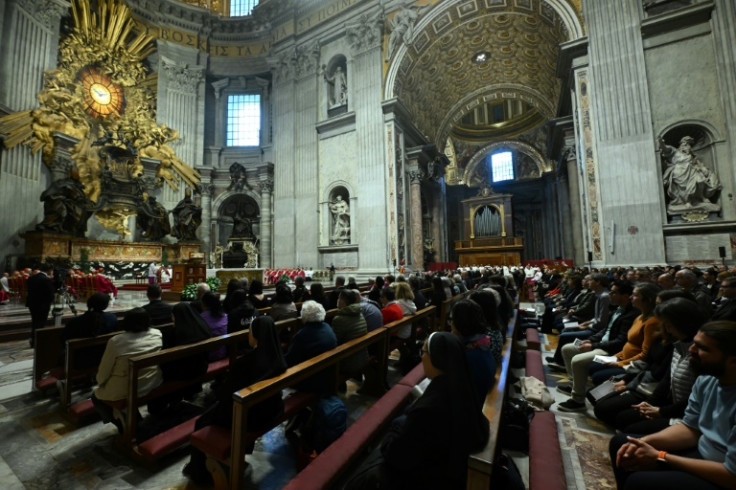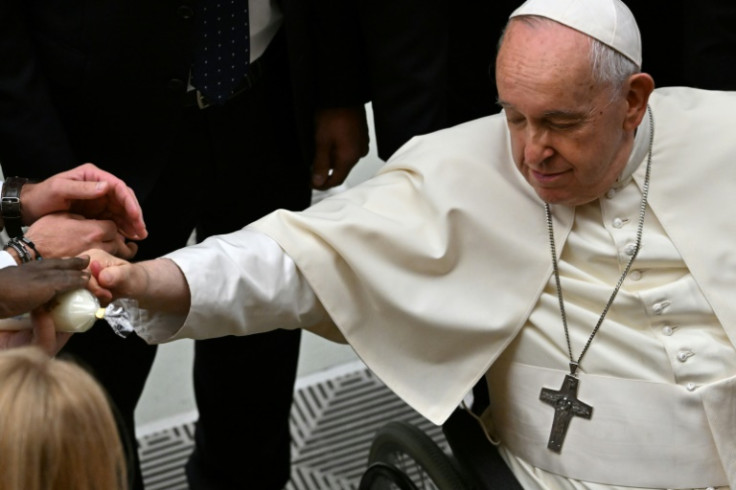Vatican Takes 'Step' Towards Transgender Catholics

LGBTQ rights campaigners welcomed a Vatican statement that transgender people can be baptised as a step towards a more inclusive Catholic Church, but denounced caveats that provide cover to those who object.
In a document published on Wednesday, the powerful Dicastery for the Doctrine of the Faith, one of the main departments that manages the affairs of the Holy See, said transgender believers can be baptised if it would not cause scandal or confusion.
The document, written in response to questions from a Brazilian bishop and approved by Pope Francis, also raised no objections to baptism for the children of same-sex couples, either adopted or born through surrogacy.
In reality, such baptisms already occur in different dioceses around the world.
But by putting it in black and white, the Vatican appears to be insisting on the importance of the vision promoted by the pope since he took office in 2013, that the Church should be "open to all".
"It is definitely a step towards a more inclusive church and a reminder that transgender Catholics are not only people but Catholics too," US Jesuit priest James Martin, a well-known advocate for LGBTQ believers, told AFP.
"In many parishes and dioceses they have been severely excluded. I hope that this Vatican ruling now makes it easier for them to feel part of what is, after all, their Church too."
Jean-Michel Dunand, founder of the French community of Bethanie, which serves gay and transgender believers, said the Vatican statement was "consistent with the magisterium (teaching) of Pope Francis".
The 86-year-old pontiff's pastoral approach emphasises the importance of personal journeys among the world's 1.3 billion Catholics.
Just weeks after taking office, he famously said that if someone was gay, searching for God's guidance and had goodwill, then "who am I to judge him?".
But many conservatives object to what they see as a "LGBTQ lobby" in the Church, which they accuse of seeking to change core doctrine.
Francis has made clear he believes homosexuality is a sin, while official Church doctrine states same-sex acts are "intrinsically disordered".
The Vatican statement said that transgender believers "can receive baptism, under the same conditions of other faithful, if there is no situation in which there is a risk of generating public scandal or uncertainty among the faithful".
Some see this formulation as sufficiently vague to be interpreted by priests according to their own views -- allowing dioceses to continue operating differently, as before.
"The positive side is that the pope says it, and that can provide support to priests" already baptising transgender believers, said Jonas Senat, a transgender Catholic who leads a prayer group in the French city of Marseille.
Martin, the US priest, said that "there is, of course, a risk that some dioceses and parishes will continue to exclude them".
But he said it was "difficult to see" what the "scandal" might be that precludes a baptism, adding: "Frankly, the bigger scandal would be to continue to exclude them from the life of the church."
The statement came just days after the closing of the general assembly of the Synod, a nearly four-week discussion among bishops and laity on the future of the worldwide Catholic Church.
The meeting highlighted significant geographic and cultural differences on key issues.
But its final conclusions avoided taking a firm position in many areas, including the blessing of homosexual couples, to which conservatives are strongly opposed.
For observers, it was a sign of the pope's delicate balancing act that seeks to open up the Church while not exacerbating divisions.
One Vatican-watcher, speaking on condition of anonymity, said this week's statement on baptisms offered "elements which comfort both camps".
Senat added: "I have the impression that he (Pope Francis) is on a tightrope -- on the one hand telling people not to judge, to love and be welcoming, on the other repeating that homosexuality is a sin."


© Copyright AFP 2024. All rights reserved.







